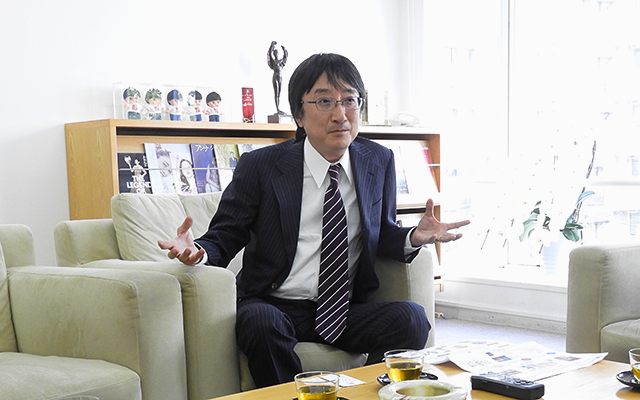
With permission from © HoriPro International, Inc. / Photo: © grape Japan
Interview With Horipro International CEO Yoshitaka Hori (Part 1): Founding Motives
- Tags:
- anime songs / CEO / entertainment industry / Horipro / Horipro International / Interview / Japanese entertainment / leader / musicians / President / Theater / visionary / voice actors / Yoshitaka Hori
Related Article
-

‘The World’s Tastes Have Turned Japanese,’ Says Pop Culture Guru Matt Alt
-

J.K. Rowling’s Harry Potter And The Cursed Child on Stage finally makes its debut in Japan
-

Absurdly Popular Pop Team Epic Anime Takes Internet By Storm
-

The Meaning Behind The Matrix Code Is Finally Revealed
-

We Interviewed YuNi, A Rising VTuber Who Aims To Be The World’s Top Virtual Singer
-

Batman Ninja The Show is Japan’s first Batman theater production


Introduction
In June 2018, Japanese entertainment giant HoriPro Inc. announced the creation of HoriPro International, a new company wholly owned by HoriPro, with the goal of aggressively expanding overseas with a focus on Asia. Aiming for the “creation of world-class specialists,” HoriPro International manages voice actors and music artists with international potential. May’n, Azusa Tadokoro, Ami Wajima, Machico, DJ YURIA, and cosplayer Liyuu are some of the more famous members in the current lineup.
At the helm of HoriPro International is visionary leader Yoshitaka Hori, President & CEO of HoriPro Inc. A vital contributor to the HoriPro Group ever since he joined in 1993, Mr. Hori has been president since 2002 and chairman since 2008.
We had the good fortune of interviewing Mr. Hori at length in his Meguro office to gain insights into the background and establishment of Horipro International, his vision for Japanese musical and voice talents as well as stage productions on an international scale and the way his own experiences abroad have influenced his thinking.
Our interview will be released in three parts.
Interview
Note: Mr. Hori was accompanied during the interview by Mr. Yukinobu Yatabe, an experienced director at Horipro International
grape Japan (gJ): Thank you for sharing your valuable time with us today.
Yoshitaka Hori (YH): No, no, thank you as well.
gJ:Thank you for your cooperation.
YH: My pleasure.
Challenges for the Japanese entertainment industry
gJ: So then, for my first question, I’d like to ask why, at this particular moment in time, did you decide to set up a separate company to handle international affairs?
YH: For almost ten years, we’d been getting international requests from people we had no previous ties with, asking our anime song artists to attend events abroad. At the same time, our stage division has put on productions by Yukio Ninagawa in many parts of the world, so we’ve been feeling the need to internationalize.
The Japanese entertainment market is 99.9% born in Japan and consumed in Japan, which is the way things have been done for the past 60 years or so. We were the world’s 2nd biggest entertainment market. But as the entertainment market in other Asian countries has grown, Japanese entertainment power has weakened in comparison. That’s another reason.
Looking at statistics, no matter how hard we try, our population is decreasing. What that means for the entertainment industry is if people keep doing things the same way as before, there’s no doubt that their numbers are going to decrease too. We can’t just stand by and let that happen. So, as Japanese entertainment producers, about the only market left for us to explore where we can start from zero is the Internet and abroad. There’s nowhere else for us to "attack."
With permission from © HoriPro International, Inc. / Photo: © grape Japan
A need for speed
Maybe about six or seven years ago, we set up projects within the company and tried all kinds of things. For stage productions, the people in charge were already all bilingual and could go anywhere they needed to. But for anime production or anime singer management, they had to be in the same division as other artists, so-called domestic artists.
Even when opportunities came up, they were in a very “Japanese salaryman” type organization so they couldn’t take risks. Management was naturally worried that any losses incurred would have negative influences in other areas of the company. That’s very important when it comes to protecting the company, but it really gets in the way when you’re trying to go on the offensive. Although they already had proposals lined up, I couldn’t go around and personally check every one of them. At the same time, I didn’t like the idea of getting watered down proposals after going through the intermediary of several people on the way up, so I decided we’d just better make a new company. Whether we succeed or fail, it would be our responsibility. In exchange, we’d move much faster.
Asia-focused approach
Until now, the image of international expansion for most Japanese people has always been the United States or Europe. But even though Japan’s an advanced country, it faces a decreasing population and a decreasing GDP. Maybe not the US, but Europe is starting to follow the same pattern. Russia is certainly that way. Birth rates declining everywhere... except for France. The United States is a country of immigrants, so more and more people are coming in.
But when you think that only 7 hours by plane from Haneda Airport there are 4 billion people where the middle class is going through explosive growth and the wealthy class is growing more than anywhere, it’s clear from a geopolitical standpoint that Japan should turn its eyes towards Asia. And within Asia, I’d say China is the biggest market right now. In the next 20 or 30 years, there’s no doubt that things will revolve around China and—who knows—maybe people will think of the United States and Europe as extensions of China.
While our stage division has had its sights set on Broadway and the West End from the beginning, with others, it’s a mixed bag, so it’s winner takes all. And to make it Asia-focused, we wanted to create Horipro International. Our stage division will ultimately create a production on Broadway. It will be made in Japan and we’ll get royalties for it. Until now, we’ve been the ones always paying, so we’re aiming to be on the receiving end. It’s this two-pronged approach we’d like to take. It’s a bit complicated, but that’s it in a nutshell.
With permission from © HoriPro International, Inc. / Photo: © grape Japan
Embracing the smartphone age
gJ: Thank you. I’d like to ask you later about Broadway—about musicals, that is—but first, I have other questions. This may overlap a bit with your earlier responses but what would you say has evolved from your previous strategy. And if possible, could you please tell us what your objectives are going into the future?
YH: We haven’t yet evolved from our previous state, and that’s the problem. Even if you only look at the anime singers we don’t manage, you could say that’s the case. They’re all isolated points. We haven’t reached the stage where we’ve built a market for them yet. It seems that everyone—Japanese people—are convinced that “Japanimation” is amazing, but it only accounts for a small part. On the global market, it’s just about a 4% share of the pie. I often say this when I give talks, but Japan’s entire anime industry is only worth 2 trillion yen. By comparison, I always mention Lion King, which, by itself is worth 2 trillion yen. There’s no way we can win against such competition. Some Japanese people are convinced the American market is very open and it’s easy to enter but in fact, there are many obstacles. Especially when it comes to their entertainment culture, there’s an impulse to keep foreign elements away.
Within that context, Japanimation, especially with the arrival of the Internet age, spread all over the world. And in a way, that’s thanks to illegal pirate DVDs and VCDs, although they’ve now disappeared. It’s because there was a need for it. So, although there might be a business opportunity targeting the 20 million anime fans in the United States, they only represent a few percent of the 7 billion.
And now in the smartphone age, when neither country borders nor time zones matter, and you can be online 24 hours a day, there’s never been a more favorable wind, especially for Japanese people living in the so-called Far East. We must use this tool through which we can overcome the differences in distance, time zone and ethnicity that faced us until now. We mustn’t think of bad outcomes. Asians have adapted to this way of thinking more than anyone else.
May'n in Singapore: A showcase of success
There’s a singer in our company, May’n, who this guy manages (points to Mr. Yatabe). She was our most important litmus test. Some years ago, we received an offer. They told us they were doing an anime festival in Singapore for the first time and they wanted May'n to perform.
With permission from © HoriPro International, Inc.
We’d never heard of them before, so at first, we wondered if it was OK to accept. The normal reaction in that situation would be to say: “Don’t do it, they could be trying to trick us.” But instead, we decided to give it a shot. We’d think more carefully about it after going there and seeing how it turns out. As a result, her performance ended up being a showcase.
There was a need for her there and she went. But the song she sang had never been broadcast anywhere in the world. This anime series has continued for 20 years but there was a lawsuit between the copyright holders in Japan and the United States. And yet, as I witnessed with my own eyes and ears, people were singing this theme song that had never been broadcast anywhere, in Japanese, wherever we went. He realized it too (points to Mr. Yatabe). We knew that our chance is now.
Nothing ventured, nothing gained
For better or worse, there are very few other family-owned companies in the entertainment industry. Most entertainment companies think the best way of scoring a perfect 10 is to avoid taking risks while you’re in charge so you don’t have any failures. But we’re family-owned, and if we begin thinking of no failure as a perfect 10, we’ll disappear as a company one day. Stars will never be born. Rather than thinking about how to avoid failure at all times, we only think about how to succeed. There’s not a single entertainer who goes into the business thinking they won’t be successful. Everyone’s always convinced they’ll become stars.
That’s the way to think. If they take action while I’m still alive and healthy (points to Mr. Yatabe), their generation will do it next, and the next generation after that. But if we don’t do it now, even if we make mistakes... for the next 20 or 30 years, if the business structure of Japan’s entertainment industry doesn’t change, it will all crumble, and we’ll say: “Too bad, that’s the end. We should have acted when we had the chance.” I don’t want that to happen, that’s all.
With permission from © HoriPro International, Inc. / Photo: © grape Japan
What it takes to work at Horipro International
gJ: I understand. Could you tell me what your strategy is concerning members who have newly joined Horipro International?
YH: I don’t have anything like a strategy for that. I put them in charge of it all (points to Mr. Yatabe). We don’t say anything we don’t need to. All we tell them is to find people who are easy to work with, people who really enjoy what they do at Horipro. There’s never any internal transferring, not as long as they’re in this company. We’ll never have someone say: “I wanted to work on anime songs, but I ended up in TV drama production.” I can give you a 100% guarantee on that. Because we’re a subsidiary. This is a niche market, as far as Horipro is concerned, but we tell them to find people who can really become passionate about this line of work. That’s all it is. I don’t say anything else... And before I knew it, we had foreigners sitting in the office.
Continued in Part 2...
Original interview in Japanese (abridged): 世界に通用するスペシャリストの創出を目指す ホリプロ社長・堀義貴氏インタビュー